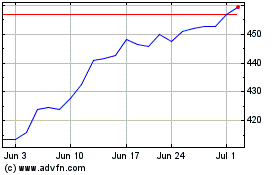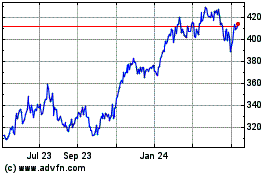Microsoft Reports Gains in Cloud-Computing Business -- 2nd Update
January 31 2018 - 7:12PM
Dow Jones News
By Jay Greene
Microsoft Corp. took a $13.8 billion charge related to the new
U.S. tax law but reported significant growth in its cloud
operations, the business fueling the company's resurgence.
Microsoft keeps overseas the vast majority of its cash, which
rose to $142.8 billion in the quarter. In an interview, Chief
Financial Officer Amy Hood declined to say when the company might
bring home some of that money.
Ms. Hood said Microsoft has been "one of the leading returners
of capital to shareholders" in recent years, using debt to finance
much of that. She said the cash would mitigate the need to turn to
debt markets to pay for stock repurchases.
Microsoft already has carved a spot for itself as the No. 2
company behind Amazon.com Inc. in renting computing power and
storage over the web. For its fiscal second quarter, the company
reported strong gains in the two biggest pieces of its
cloud-computing business: its Azure infrastructure services and
Office 365 online-productivity business.
Though Microsoft doesn't disclose revenue for those businesses,
it said Azure jumped 98% and Office 365 grew 41%. In the previous
quarter, Azure gained 90% and Office 365 grew 42%.
Its Intelligent Cloud segment, which includes Azure, climbed 15%
to $7.8 billion. Its Productivity and Business Processes segment,
which includes Office, gained 25% to $8.95 billion.
Overall, Microsoft posted a loss of $6.3 billion, or 82 cents a
share, compared with a profit of $6.27 billion, or 80 cents a
share, a year earlier. Revenue grew 12% to $28.92 billion.
Excluding the impact of the tax law, Microsoft reported a profit
of $7.5 billion, or 96 cents a share.
Analysts surveyed by S&P Global Market Intelligence expected
Microsoft to report per-share earnings of 86 cents on revenue of
$28.41 billion.
Shares, which have climbed nearly 50% in the past year to set
records, fell a penny to $95 in after-hours trading.
The company's adjusted tax rate, which doesn't count the big
charge, was 18%, up slightly from a year ago. Looking ahead, Ms.
Hood said it expects a 16% tax rate for the second half of the
fiscal year, plus or minus 2 percentage points. For fiscal 2019,
the company expects the tax rate to be slightly below the new U.S.
corporate rate of 21%.
Microsoft rose to its former tech dominance on the strength of
Windows, its PC operating system. And while the More Personal
Computing segment that includes Windows is Microsoft's largest, it
is also the company's slowest growing.
That is in part because growth in world-wide PC sales remains
sluggish, inching up only 0.7% in the last quarter, according to
International Data Corp. More Personal Computing, though, gained 2%
to $12.17 billion in the latest period.
In a conference call with Wall Street analysts, Chief Executive
Satya Nadella said investments in security technology helped
Microsoft quickly address the recent threats from the Spectre and
Meltdown processor vulnerabilities.
"Our investments to make Windows 10 the most secure, always
up-to-date operating system enabled us to move quickly to protect
customers in the face of these threats," Mr. Nadella said.
The More Personal Computing segment also includes Microsoft's
Xbox videogame business. The holiday quarter is particularly
important for gaming at Microsoft, even more so after the company
released its new Xbox One X console in November. In the period,
gaming revenue -- which includes sales of the Xbox console, Xbox
Live subscriptions and transactions, and game and accessory sales
-- rose 8%.
It has been a year since Microsoft purchased LinkedIn Corp., the
professional social network, for $27 billion. In the quarter,
LinkedIn added $1.31 billion in revenue.
Write to Jay Greene at Jay.Greene@wsj.com
(END) Dow Jones Newswires
January 31, 2018 18:57 ET (23:57 GMT)
Copyright (c) 2018 Dow Jones & Company, Inc.
Microsoft (NASDAQ:MSFT)
Historical Stock Chart
From Mar 2024 to Apr 2024

Microsoft (NASDAQ:MSFT)
Historical Stock Chart
From Apr 2023 to Apr 2024
